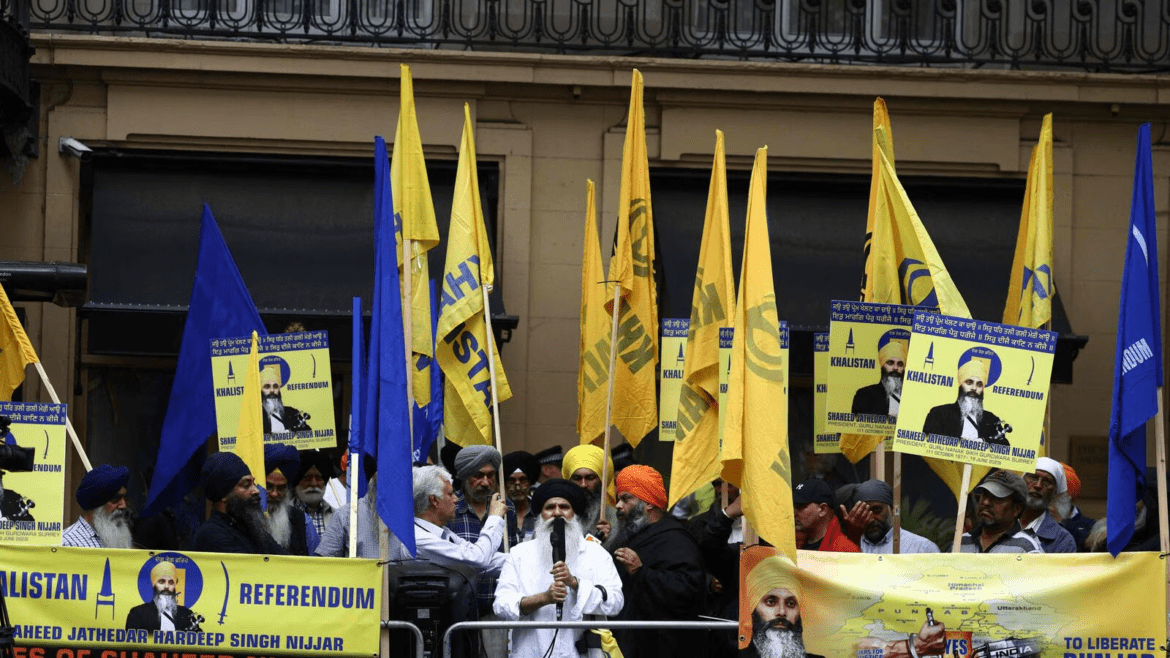AI Generated Summary
- It is essential to recognize that the Khalistan movement, which advocates for a separate Sikh state, is not representative of the Sikh community as a whole.
- His engagement with the Sikh Federation UK raises concerns, as the organization is widely recognized for its open backing of Khalistan—a separatist agenda that does not reflect the sentiments of the broader Sikh community.
- The #Sikh Gurdwara committee in a Glasgow Gurdwara put on a community reception to host the Indian High Commissioner @VDoraiswami.
In recent years, the discourse surrounding Sikh activism in the UK has taken a troubling turn. Allegations of harassment by Indian agencies, purportedly targeting British Sikhs, have surfaced, as highlighted in a recent report. These accusations, however, lack credible evidence, raising concerns about the motives behind such claims. While legitimate grievances deserve attention, we must distinguish them from politically motivated propaganda that risks sowing discord and fostering extremism.
The recent allegations of Indian interference in the UK have been made without substantiation. Even UK authorities, known for their rigorous investigative processes, have not corroborated these claims. This absence of evidence speaks volumes. To ensure justice and accountability, claims must be grounded in verifiable facts. Anything less undermines the integrity of public discourse.

British Security Minister Dan Jarvis has rightly asserted that the targeting of Sikhs or any community by a foreign government would not be tolerated, reaffirming the UK’s commitment to protecting all its citizens. However, his engagement with the Sikh Federation UK raises concerns, as the organization is widely recognized for its open backing of Khalistan—a separatist agenda that does not reflect the sentiments of the broader Sikh community. Notably, many Sikh voices have publicly distanced themselves from the Sikh Federation, criticizing its divisive rhetoric and lack of alignment with the majority of the Sikh diaspora’s values. This paradox in Jarvis’s approach risks legitimizing fringe elements while alienating the peace-loving Sikh majority.
Baseless accusations not only tarnish reputations but also divert attention from genuine issues. They serve as a reminder of the dangers of allowing fringe groups to dominate the narrative without scrutiny.
Geopolitical Agendas and the Khalistan Question
It is essential to recognize that the Khalistan movement, which advocates for a separate Sikh state, is not representative of the Sikh community as a whole. Many Sikh individuals and families in the UK, as well as globally, cherish their Indian heritage while contributing positively to their adopted homelands.
So that we are clear. The #Sikh Gurdwara committee in a Glasgow Gurdwara put on a community reception to host the Indian High Commissioner @VDoraiswami. A group of out of town Pro Khalistan activists turn up and physically intimidate the local Sikh committee, and try and attack…
— Colin Bloom CBE (@ColinBloom) September 30, 2023
However, certain Khalistan-affiliated groups have a history of anti-India propaganda. Their actions often reflect ideological or political agendas that do not align with the broader Sikh diaspora. For instance, reports from Canadian intelligence have documented links between some Khalistani activists and violent extremism. If the UK does not tread carefully, it risks becoming a hotbed for similar activities.
The timing of these allegations is particularly concerning, given the strengthening ties between India and the UK. The two nations share a robust partnership, collaborating on trade, counterterrorism, and cultural exchange. False claims and divisive rhetoric jeopardize this relationship, which benefits both countries.
India has shown its commitment to Sikh welfare through initiatives like the Kartarpur Corridor, which facilitates pilgrimages to one of Sikhism’s holiest sites, and efforts to preserve Sikh heritage. These actions reflect a government that values pluralism and the Sikh community’s significant contributions.
The Role of UK Politicians
In this context, UK politicians must approach such matters with caution. Engaging with or endorsing fringe elements risks normalizing their views and amplifying their influence. Canada offers a cautionary tale. There, certain political figures, under the guise of pandering to vote banks, have turned a blind eye to extremist rhetoric, inadvertently creating an environment conducive to radicalization. The assassination of Canadian citizen Hardeep Singh Nijjar, linked to violent activities, underscores the dangerous consequences of such neglect.
The UK has long prided itself on being a beacon of multicultural harmony and freedom of expression. To maintain this, it is imperative to draw a clear line between advocacy for community rights and enabling extremism. Politicians must ensure their support does not inadvertently legitimize fringe agendas that could destabilize the UK’s own security environment.
Allowing unsubstantiated allegations to dominate discourse risks more than just diplomatic fallout—it endangers communal harmony within the UK. The Sikh community, like all others, is diverse and multifaceted. Most Sikhs value peace, dialogue, and coexistence, yet their voices are often drowned out by those with radical inclinations.
The UK must also focus on combating extremism of all forms. Law enforcement agencies have already flagged the rise of Khalistani elements involved in illicit activities. A proactive approach is needed to address these threats, ensuring safety for all communities while upholding democratic values.
India and the UK are partners in democracy, bound by shared values and mutual respect. Let us not allow baseless allegations to cloud this partnership. Instead, let us focus on fostering understanding, addressing genuine grievances, and countering extremism in all its forms. Only through such balanced engagement can we ensure a future of harmony and progress.




